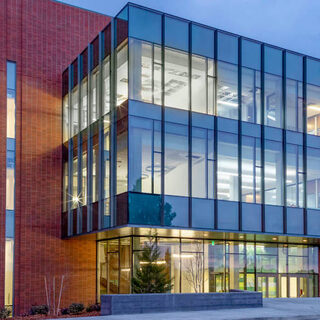Perkins&Will
In the News
Washington State University Dedicates Animal Disease Diagnostic Laboratory
Washington State University dedicated the $61.9 million Washington Animal Disease Diagnostic Laboratory in May of 2021. Designed by Perkins&Will, the 61,000-sf facility represents an expansion of the Paul G. Allen Center for Global Animal Health in Pullman. Enabling the detection and diagnosis of human and animal diseases including SARS-CoV-2, avian influenza, BSE, and West Nile virus, the three-story building houses instructional venues, collaboration spaces, a high-bay necropsy suite, and specialized labs for testing, research, and development.
University of Cincinnati Breaks Ground on College of Law
The University of Cincinnati began construction in March of 2021 on a $45.6 million renovation and expansion of Linder Hall to create a new home for the College of Law. Designed by Perkins+Will and BHDP Architecture, the project will repurpose and enlarge the 84,443-sf structure to create a 116,635-sf facility featuring a two-story lobby atrium, three flexible 50-seat classrooms, a 90-seat classroom, and a 160-seat auditorium that can function as an appellate courtroom.
Western Washington University Plans Computer Science and Engineering Building
Western Washington University is planning to construct the $68 million Kaiser Borsari Hall in Bellingham. Designed by Perkins+Will, the 40,000-sf structure will accommodate the school's growing programs in computer science and electrical engineering. The collaborative four-story building will provide experiential learning venues, teaching and research labs, classrooms, offices, breakout areas, a multicultural student lounge, a commons, and a mechanical basement.
University of Texas at El Paso Opens Interdisciplinary Research Building
The University of Texas at El Paso opened the $93.5 million Interdisciplinary Research Building in September of 2020. Designed by Perkins+Will, the 156,000-sf project provides collaborative research labs, a vivarium, imaging suites, core labs, a visualization suite, conference rooms, an atrium, an auditorium, and academic and administrative offices. Housing teams from multiple departments, the flexible facility can be easily adapted to accommodate changing program requirements.
Bowling Green State University Dedicates College of Business
Bowling Green State University dedicated the $44.2 million Robert W. and Patricia A. Maurer Center in September of 2020 in Bowling Green, Ohio. Designed by The Collaborative and Perkins+Will, the 89,800-sf project included the construction of a 50,000-sf addition and the renovation of Hanna Hall to create a new home for the Schmidthorst College of Business.





